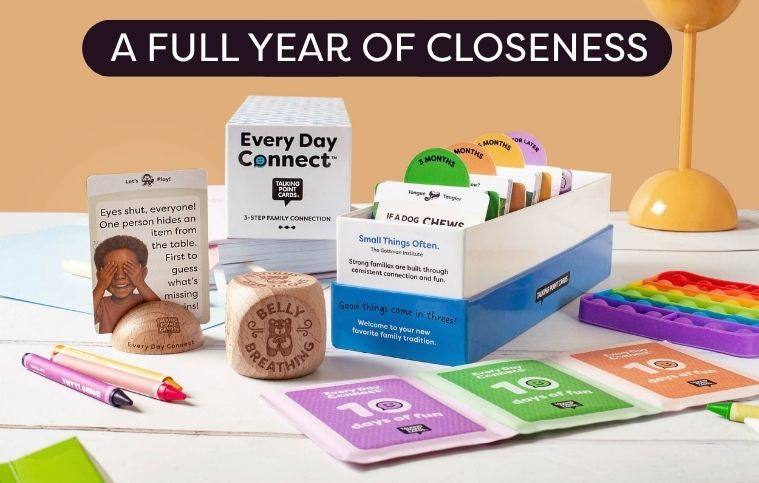SHOP
About
The Slow Fade Into Nothing
When "Fine" Becomes Your Love Language
The Question That Changed Everything
How One Question Became Many
Why Regular Questions Stopped Working
The Science Behind Deep Connection
Small Changes, Big Shifts
What We Learned About Love
The Questions That Brought Us Back
Why This Matters More Than You Think
The Ripple Effect
Where We Are Now
What's Possible for You
Shop Avatar Products
We'd become experts at the mundane.
"Did you pay the electric bill?"
"What time is Emma's soccer practice again?"
"Can you grab milk on your way home?"
If you'd recorded our conversations over the past few months, you'd have thought we were business partners running the most boring corporation in the world. Which, in many ways, we were.
I don't know exactly when it happened. One day we were the couple who'd stay up until 2 AM talking about everything and nothing, and then... we weren't.
Sound familiar? You're not alone. Research shows that 65% of couples cite poor communication as their biggest challenge, and relationship satisfaction tends to decrease between the ages of 20 and 40, reaching a low point around age 40.
But here's the thing about drift—it happens so slowly you don't even notice it's happening. Until one day you look at the person sitting across from you at dinner, scrolling their phone while you scroll yours, and you realize you're living with a stranger.
The Slow Fade Into Nothing
It started innocently enough. Life got busy. Kids, work, the never-ending to-do list that somehow kept growing despite our best efforts to tackle it. Our conversations became transactional—logistics meetings disguised as pillow talk.
"Don't forget about parent-teacher conferences Thursday."
"The dishwasher's making that noise again."
"Did you see the credit card bill?"
Functional. Efficient. Soul-crushingly empty.
I remember one evening, sitting on the couch after the kids were finally asleep, and my husband asked, "How was your day?" It should have been a simple question. Instead, I felt... nothing. Not because my day was bad, but because I couldn't remember the last time he'd asked and actually wanted to hear the answer.
"Fine," I said, not looking up from my phone.
"Good," he replied, already turning back to his laptop.
And that was it. Our entire emotional exchange for the day condensed into two words that meant absolutely nothing.
When "Fine" Becomes Your Love Language
Roommate syndrome is characterized by a lack of passion, dwindling communication, loss of connection, and a sense of emotional distance. That's exactly where we found ourselves - two people sharing a mortgage and a Netflix password, but not much else.
We were polite to each other. We divided chores fairly. We took turns doing bedtime routines and weekend errands. On paper, we were the picture of domestic efficiency.
But something vital was missing. That spark, that curiosity about each other that had once made late-night conversations feel like discoveries.
I started to wonder if this was just what happened in long-term relationships. Maybe the movies lied to us. Maybe "comfortable" was supposed to feel this... empty.
The scariest part wasn't the silence—it was how normal it had started to feel.
The Question That Changed Everything
It was a random Tuesday evening. We'd gotten through the usual routine: dinner, homework supervision, dishes, kids to bed. I was mentally preparing for another evening of parallel phone scrolling when my husband did something unexpected.
He put his phone down and looked at me. Really looked at me.
"Can I ask you something?" he said.
I nodded, curious despite myself.
"Tell me about a typical day in your life before we met. How has that changed over time?"
I blinked. This wasn't "How was your day?" This was... different. Deeper. It required me to think, to remember, to actually share something real.
And you know what? I wanted to answer it.
For the first time in months, I found myself talking - really talking - about who I used to be, what I'd dreamed about, how becoming "us" had shifted everything in ways both beautiful and complicated.
He listened. Not the distracted "mm-hmm" listening while mentally composing tomorrow's to-do list, but actual, engaged, curious listening.
Then it was his turn to answer, and I learned things about the man I'd been married to for eight years that I'd never known.
How One Question Became Many
That conversation unlocked something between us. Not immediately—we didn't suddenly transform back into those early-relationship people who couldn't keep their hands off each other. But something shifted.
The next night, he asked another question. Something about childhood memories and which ones had shaped who we'd become. I found myself sharing stories I hadn't thought about in years.
A few days later, I was the one asking: "What's something you believed about love when you were younger that you don't believe anymore?"
These weren't small talk questions. They were the kind of questions that require you to pause, to think, to be vulnerable. The kind that make you remember why you fell in love with this person's mind in the first place.
Why Regular Questions Stopped Working
Here's what I realized: we'd been asking each other the same questions for years.
"How was work?"
"What do you want for dinner?"
"Did you hear from your mom?"
These questions had become verbal habits, like saying "bless you" after someone sneezes. Automatic responses to social cues rather than genuine attempts at connection.
But questions about our past selves, our secret thoughts, our evolving perspectives? Those required presence. They demanded we show up as the full humans we were, not just the efficient life-management team we'd become.
The Science Behind Deep Connection
Turns out, this wasn't just about us getting lucky with one good question. Research shows that integrating meaningful questions into daily life can enhance open communication, deepen emotional intimacy, and strengthen relationships.
The magic isn't in the questions themselves - it's in what they create. Space for curiosity. Permission to be more than just the roles we play (parent, employee, mortgage-payer, grocery-shopper).
When was the last time someone asked you who you were outside of what you do?

Rated #1 Couples Product
Rediscover each other, deepen intimacy, and spark conversations that bring you closer, every day.

Small Changes, Big Shifts
We didn't overhaul our entire relationship overnight. We're still the people who forget to pay the electric bill on time and argue about whose turn it is to clean the bathroom.
But now, a few times a week, one of us will ask a real question. Sometimes it's profound ("What's a risk you're glad you took?"), sometimes it's playful ("If you could have dinner with any fictional character, who would it be and why?").
The questions themselves matter less than the intention behind them: I want to know you. Not just the you who manages our shared life, but the you who dreams and worries and wonders about things.
What We Learned About Love
Here's what those conversations taught us: we'd never actually stopped loving each other. We'd just stopped being curious about each other.
Love, it turns out, isn't just a feeling - it's an active practice of attention. Of choosing to see your partner as someone worth discovering, even after years together.
Especially after years together.
The Questions That Brought Us Back
Some of the questions that sparked our best conversations:
"What do you wish you could go back and tell yourself 10 years ago?"
"If you were to die tomorrow, what would you regret the most?"
"What's something you thought when we first met that you no longer believe to be true?"
But here's the thing - it wasn't really about the specific questions. It was about the space they created for us to remember that we're both complicated, evolving people with inner lives worth exploring.
Why This Matters More Than You Think
I know how this might sound. "Great, you asked each other some questions and suddenly everything was perfect." That's not what happened.
What happened was subtler and more profound: we remembered how to be interested in each other again.
And that interest - that genuine curiosity about the person sharing your life - is what transforms a functional partnership back into a relationship.
Couples who actively work on communication through therapy or workshops report a 50% improvement in relationship satisfaction. But you don't need therapy to start asking better questions. You just need to decide that the person you love is worth knowing, again and again.
The Ripple Effect
Once we started having real conversations again, other things shifted too. We started laughing more. Touching more casually - a hand on a shoulder while passing in the kitchen, that kind of thing. Planning things we actually wanted to do together instead of just things we had to do.
Our kids noticed. "You guys seem happier," our ten-year-old observed one morning. Out of the mouths of babes.
We weren't different people. We were the same people, paying attention to each other again.
Where We Are Now
Six months later, we're not perfect. We still have weeks where we fall back into logistics mode, where "Fine" becomes our primary form of communication.
But now we notice when it happens. And we have tools to climb back out.
Sometimes it's as simple as one of us saying, "I miss talking to you." Sometimes it's pulling out one of those conversation-starter questions we've started collecting.
The key is remembering that the person you chose to build a life with is someone worth having real conversations with. Not just about the electric bill or soccer practice schedules, but about dreams and fears and the weird thoughts that pop into your head at 2 AM.
What's Possible for You
If you're reading this and thinking, "That sounds nice, but we're way past that point," I get it. There were moments when I thought we were too.
But here's what I learned: you don't need a complete relationship overhaul. You just need to start asking different questions.
Not every conversation needs to be deep. But some of them should be.
Your relationship doesn't have to stay stuck in functional mode. The person you fell in love with is still there, probably wondering when you stopped being curious about them too.
The path back to each other might be simpler than you think. It might start with a single question that isn't about the grocery list or the mortgage payment.
It might start with: "Tell me something I don't know about you."
And then (here's the crucial part) actually listening to the answer.
----------
Sometimes the smallest changes create the biggest shifts. Sometimes reconnecting with the person you love starts with remembering how to have a real conversation. Sometimes all it takes is the right question at the right moment to remember why you chose each other in the first place.
At Talking Point Cards, we believe that great relationships are built on great conversations. Our thoughtfully crafted prompts help couples break out of the day-to-day, rediscover each other, and spark the kind of talks that deepen love, trust, and intimacy - no matter how new or seasoned your relationship may be. Because connection isn’t automatic. It’s created, one conversation at a time.
Let's Stay Connected
Love what you’re reading? There’s more where that came from. Get fresh ideas, inspiring tips, and simple ways to spark deeper conversations - delivered straight to your inbox. Because the best connections start here. Just pop in your email below to join us.
We respect your privacy. We’ll never share or sell your information. By subscribing, you agree to receive emails from us. Unsubscribe anytime.












